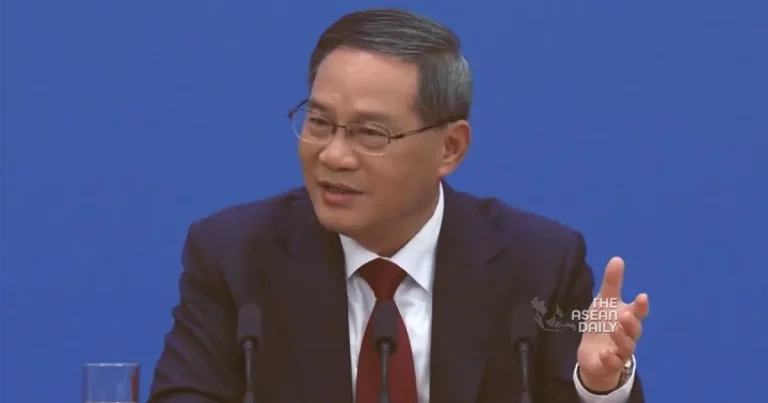6-9-2023 (JAKARTA) On Wednesday, China’s Premier Li Qiang cautioned major powers to manage their differences and avoid igniting “a new Cold War,” subtly referring to the United States. Li made these remarks during an ASEAN-plus-three meeting in Jakarta, which included Japan and South Korea.
China has voiced concerns about the formation of US-backed alliances near its borders and continues to grapple with regional disputes, particularly in the South China Sea.
Li acknowledged that disagreements and disputes could arise between countries due to misperceptions, diverging interests, or external interferences. To maintain control over these differences, he emphasized the importance of opposing alignment with any particular side, bloc confrontation, and the emergence of a new Cold War.
These comments follow Chinese Defence Minister Li Shangfu’s warning in June against the formation of NATO-like alliances in the Asia-Pacific region. He called for “inclusive cooperation” rather than “small cliques” during the Shangri-La Dialogue in Singapore.
The meetings in Jakarta provided an opportunity for major powers to engage with the ASEAN bloc and navigate their rivalries. Notably, US Vice President Kamala Harris attended in place of President Joe Biden, while Premier Li represented President Xi Jinping.
This diplomatic engagement precedes the 18-member East Asia Summit on Thursday, featuring Russian Foreign Minister Sergei Lavrov, and the upcoming G20 summit in New Delhi, where broader geopolitical issues are expected to take center stage.
During her meetings with ASEAN leaders, Vice President Harris commended their “shared commitment to international rules and norms” and addressed regional issues. She announced the establishment of the first US-ASEAN center in Washington, signaling increased US regional engagement.
Japanese Prime Minister Fumio Kishida and South Korean President Yoon Suk Yeol also participated in the meetings, discussing various topics, including the release of treated wastewater from the damaged Fukushima nuclear plant.
ASEAN leaders expressed their determination not to become a proxy for big power competition and emphasized their neutrality in US-China tensions over Taiwan, the South China Sea, and Russia’s Ukraine invasion.
The roundtable discussion involving Lavrov and Harris marked the first high-level US-Russia encounter since a foreign ministers’ meeting in Jakarta in July, during which US and European officials criticized Moscow’s top diplomat over the Ukraine conflict.
Future summits will include Indian Prime Minister Narendra Modi, Australian Prime Minister Anthony Albanese, and United Nations Secretary-General Antonio Guterres.
Albanese expressed Australia’s interest in closer engagement and economic ties with Southeast Asian nations during a regional forum in Jakarta.
Myanmar remained a significant issue at the summits, with Southeast Asian leaders condemning the violence and attacks on civilians, directly blaming the junta. Harris reiterated Washington’s commitment to pressuring the regime to end violence, release unjustly detained individuals, and restore Myanmar’s path to inclusive democracy.
China’s release of a new official map claiming sovereignty over most of the South China Sea sparked criticism from several ASEAN members, including Japan, Malaysia, Vietnam, and the Philippines. ASEAN leaders expressed concerns about land reclamations, activities, and serious incidents in the disputed South China Sea.
Despite these concerns, experts anticipate that ASEAN leaders will avoid direct confrontation with China to preserve their relationships with major powers.




